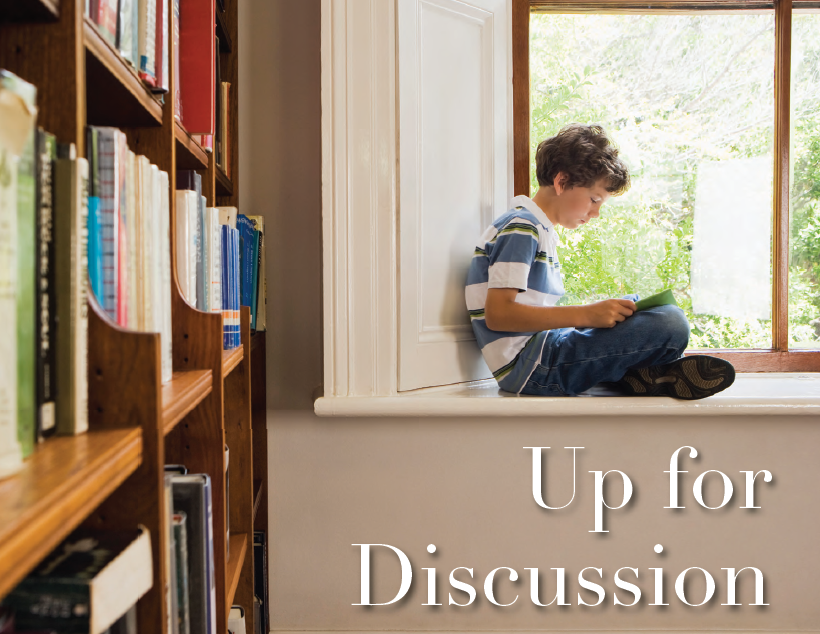A lifelong appetite for reading begins with that first taste in the classroom.
 A great debate is raging in the tech world. It concerns the type of devices today’s youth will be using to read books a decade from now. Will there be a way-cooler version of the iPad? Will smart phones become personal libraries? Will the printed page magically appear in space a foot or two away? Fun stuff. Star Trek stuff—going where no book has gone before. But these flights of fancy tend to overlook a more immediate issue concerning New Jersey’s parents and educators: Will tomorrow’s 20-somethings be reading books at all? Before sounding the alarm bell too loudly, it’s worth noting that New Jersey students, as a group, mop up on just about every standardized test that measures reading proficiency. However, proficiency does not guarantee a lifelong love of reading. Every scrap of evidence available on the reading habits of adults tells us that they echo their experience with literature in grade school and high school. Indeed, kids who regard reading
A great debate is raging in the tech world. It concerns the type of devices today’s youth will be using to read books a decade from now. Will there be a way-cooler version of the iPad? Will smart phones become personal libraries? Will the printed page magically appear in space a foot or two away? Fun stuff. Star Trek stuff—going where no book has gone before. But these flights of fancy tend to overlook a more immediate issue concerning New Jersey’s parents and educators: Will tomorrow’s 20-somethings be reading books at all? Before sounding the alarm bell too loudly, it’s worth noting that New Jersey students, as a group, mop up on just about every standardized test that measures reading proficiency. However, proficiency does not guarantee a lifelong love of reading. Every scrap of evidence available on the reading habits of adults tells us that they echo their experience with literature in grade school and high school. Indeed, kids who regard reading  as an unpleasant reality of their education— or worse, as cruel and unusual punishment that steals precious time away from video games, social networking and VH1—are unlikely to pick up a decent book after the age of 20. Conversely, kids who encounter great books and great teachers, or who are at least challenged in some way by important literature, are not only far more inclined to be eager readers throughout adulthood. They are much more likely to see the world in a layered and sophisticated way. Given the powerful pull of competing media, when is the right time to start introducing great books to young readers? Although educators may quibble about theories and practices, on this one point, there is near-universal agreement. Harriet Marcus, chair of the Upper School English Department at Oak Knoll School of the Holy Child in Summit, insists that it is “never too early to present the great universal ideas to children.” Jane Freeman, of Solomon Schechter Day School in West Orange, maintains that great literature should be introduced from the moment “a child can understand the spoken word.” Noreen Andrews, of Union Catholic in Scotch Plains, concurs. “At birth,” she smiles. Actually, there’s some truth to this idea. “Babies are introduced to great literature when they are sung to and read to as infants,” points out Sister Regina Martin, Principal of Mother Seaton Regional High School in Clark. She says that “while the books they hear are not great classics per se, babies learn to love the sound of literature, whether it is from a song, a nursery rhyme, or a bedtime story.” Once a school gets its hands on a young reader, that’s when things can go very right or very wrong. Talented and impassioned leadership is a must; even for the most taciturn of students, a teacher’s enthusiasm for the material ultimately will prove contagious. An instructor whose primary goal is to plow through the material, test the kids and then move on, is likely to leave uninspired readers in his or her wake. From a parent’s perspective, there is only so
as an unpleasant reality of their education— or worse, as cruel and unusual punishment that steals precious time away from video games, social networking and VH1—are unlikely to pick up a decent book after the age of 20. Conversely, kids who encounter great books and great teachers, or who are at least challenged in some way by important literature, are not only far more inclined to be eager readers throughout adulthood. They are much more likely to see the world in a layered and sophisticated way. Given the powerful pull of competing media, when is the right time to start introducing great books to young readers? Although educators may quibble about theories and practices, on this one point, there is near-universal agreement. Harriet Marcus, chair of the Upper School English Department at Oak Knoll School of the Holy Child in Summit, insists that it is “never too early to present the great universal ideas to children.” Jane Freeman, of Solomon Schechter Day School in West Orange, maintains that great literature should be introduced from the moment “a child can understand the spoken word.” Noreen Andrews, of Union Catholic in Scotch Plains, concurs. “At birth,” she smiles. Actually, there’s some truth to this idea. “Babies are introduced to great literature when they are sung to and read to as infants,” points out Sister Regina Martin, Principal of Mother Seaton Regional High School in Clark. She says that “while the books they hear are not great classics per se, babies learn to love the sound of literature, whether it is from a song, a nursery rhyme, or a bedtime story.” Once a school gets its hands on a young reader, that’s when things can go very right or very wrong. Talented and impassioned leadership is a must; even for the most taciturn of students, a teacher’s enthusiasm for the material ultimately will prove contagious. An instructor whose primary goal is to plow through the material, test the kids and then move on, is likely to leave uninspired readers in his or her wake. From a parent’s perspective, there is only so  much influence you can exert when it comes to picking a teacher to foster a love of books. Whether your child is in public or private school, it’s a hiring and firing issue that is out of your hands. Where parents can affect the outcome (besides encouraging reading at home, of course) is by asking questions about a school’s class size and format. Classroom discussion is absolutely, positively the number one factor when it comes to understanding and appreciating literature. Here, the private schools—by virtue of their smaller class sizes—typically have a distinct edge. Andrews says that small-group discussions “enable students and teachers to dig deeper for the full experience.” Karen Calta, Assistant Directress at Mount St. Mary Academy in Watchung, adds that they are “invaluable in that they serve students well in many academic areas.” Calta explains that students across a wide range of subjects are encouraged at Mount St. Mary to develop their own interpretations, while teachers serve as guides. Andrew Webster of The Wardlaw-Hartridge School in Edison agrees that an understanding and appreciation of literature is not merely a means for improving academic performance in English. “Done properly,” he says, “it enriches the lives of students and their understanding of what it means to be human. It allows them to step beyond their own experience, develop empathy, and form careful judgment.” According to Nat Conard, Headmaster of The Pingry School, literary discussion does more
much influence you can exert when it comes to picking a teacher to foster a love of books. Whether your child is in public or private school, it’s a hiring and firing issue that is out of your hands. Where parents can affect the outcome (besides encouraging reading at home, of course) is by asking questions about a school’s class size and format. Classroom discussion is absolutely, positively the number one factor when it comes to understanding and appreciating literature. Here, the private schools—by virtue of their smaller class sizes—typically have a distinct edge. Andrews says that small-group discussions “enable students and teachers to dig deeper for the full experience.” Karen Calta, Assistant Directress at Mount St. Mary Academy in Watchung, adds that they are “invaluable in that they serve students well in many academic areas.” Calta explains that students across a wide range of subjects are encouraged at Mount St. Mary to develop their own interpretations, while teachers serve as guides. Andrew Webster of The Wardlaw-Hartridge School in Edison agrees that an understanding and appreciation of literature is not merely a means for improving academic performance in English. “Done properly,” he says, “it enriches the lives of students and their understanding of what it means to be human. It allows them to step beyond their own experience, develop empathy, and form careful judgment.” According to Nat Conard, Headmaster of The Pingry School, literary discussion does more  than motivate, challenge and engage. In a learning environment that embraces diversity (Pingry counts itself among the New Jersey schools that draw from a particularly broad cultural, religious and socioeconomic spectrum), it also fosters an appreciation for multiple viewpoints. “In class discussions, our students hear ideas from students whose backgrounds are very different than their own,” Conard says. Of course, the “must-reads” provide plenty of fodder for class discussion. Simple themes have a fun way of fueling spirited debates. In Charles Dickens’ A Christmas Carol, the lesson is that cruel people can change. In Harper Lee’s To Kill A Mockingbird, young readers learn that strong people can help those in trouble. William Shakespeare’s A Midsummer Night’s Dream is a reminder that life can be filled with fantasy and fun. A great book is never finished saying what it intended to say. The words may have been consumed and the thoughts digested, but the ideas never stop. The classics go on teaching, inspiring and enlightening long after that first, indelible classroom experience. And like the moon that goes through phases and moods, so do young people and their relationship with books. Their interpretations grow. They change and they question. And, if everything goes right, as they move into adulthood, their hunger for the printed word is never satisfied. EDGE
than motivate, challenge and engage. In a learning environment that embraces diversity (Pingry counts itself among the New Jersey schools that draw from a particularly broad cultural, religious and socioeconomic spectrum), it also fosters an appreciation for multiple viewpoints. “In class discussions, our students hear ideas from students whose backgrounds are very different than their own,” Conard says. Of course, the “must-reads” provide plenty of fodder for class discussion. Simple themes have a fun way of fueling spirited debates. In Charles Dickens’ A Christmas Carol, the lesson is that cruel people can change. In Harper Lee’s To Kill A Mockingbird, young readers learn that strong people can help those in trouble. William Shakespeare’s A Midsummer Night’s Dream is a reminder that life can be filled with fantasy and fun. A great book is never finished saying what it intended to say. The words may have been consumed and the thoughts digested, but the ideas never stop. The classics go on teaching, inspiring and enlightening long after that first, indelible classroom experience. And like the moon that goes through phases and moods, so do young people and their relationship with books. Their interpretations grow. They change and they question. And, if everything goes right, as they move into adulthood, their hunger for the printed word is never satisfied. EDGE
EDITOR’S NOTE: Diane Alter is a freelance writer whose work has appeared in numerous newspapers and magazines. She has become our go-to girl whenever there’s a high-risk, low-reward story to be done. Before we sent Diane “back to school” for this story, she was assigned to cover the dating scene in New Jersey and New Jersey after midnight—with explicit instructions to produce two entirely different articles (which, somehow, she did). A couple of years ago, for another magazine, Diane checked herself into a monastery for a weekend of quiet reflection about her previous life working for a huge financial services company. Talk about penance!





